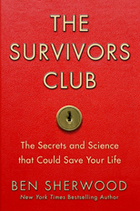 True or False:
True or False:
1. The safest seats on an airplane are at the back.
2. If you fall into a frozen lake, you have only 3 minutes to escape the water.
3. In prisoner-of-war camps in Vietnam, optimists lived longer than anyone else.
Who lives and who dies in a crisis? Do you have what it takes to be one of the passengers who walks out of the jungle after a plane crash or who keeps their cool and remembers how to work a compass when you get lost in the woods? And if you don’t (or can’t) can you learn? There are lots of books on survival tips and I have read more than a few of them. The Survivors Club: The Secrets and Science that Could Save Your Life by Ben Sherwood takes familiar territory and still turns it into a very interesting read.
I love books on survival. Doesn’t matter whether they are fiction or non-fiction: travel/adventure books about explorers deep in the wild, post-apocalyptic stories about the survivors of great disaster, non-fiction accounts of great rescues. I’ve read more than one book that claims to tell me how I can survive the zombie apocalypse, or on an ice-bound ship in the Anarctic, or in the deepest jungles of unexplored continents. Reality check: those are probably things I will never face — at least, I hope not. But I fly a lot. A LOT. Usually 2 or 3 trips per month for work (6 separate flights last month). So when a book says it can give me tips on how to survive an plane crash, I’m turning to that section first. I love exit row seats and nothing is going to come between me and that escape slide.
Sherwood’s tips are generally pretty good. That stuff about the safest seats being in the back of the plane? I think the airlines came up with that to sell bad seats. The best rule of thumb: sit on an aisle within 5 rows of the exit. That’s doable in most cases. Count the rows between you and the exit, so you can find your way out, even if it’s dark and smoky and chaotic. Don’t drink before you fly and don’t sleep during take-off and landing — all easy enough advice to follow. One of the keys to survival is being aware of your situation, knowing where you are and what’s going on around you. If taking a minute to count the rows and checking under my seat for the life vest will help, I can do that.
I have to say that I disagree with him about paying attention to the safety announcements. Watching the flight attendant may be polite, but I already know how to buckle my seat belt. I know that in the event of an emergency, aisle path lighting will guide me to the nearest exit, which may be behind me. I know that even though my mask may not fully inflate, oxygen will still be flowing. But that’s just my opinion.
Sherwood has done his research. I loved the descriptions of US Marine Corps Survival School that he attended. Surviving the SWIMMER (Shallow Water Initial Memory Mechanical Exit Release trainer) and the SWET (hallow Water Egress Trainer) – basically, big dunking machines designed to teach pilots how to get out of their helicopters during unscheduled water landings. I would love to try out the FAA’s workshop on surviving plane crashes. He talked with people who collect body odor (“What Does Fear Smell Like?”), doctors who study the science of luck (“Why Good Things Always Happen to the Same People”), even a researcher who thinks that people with initials that spell negative things (“Are Your Initials Killing You?). The author’s initials are BS — that must have been fun on the playground. I don’t know that I have a lot of faith in all of that science (my initials? really?), but I have no doubt that there are a lot of things that impact your chances for survival. The Survivor’s Club covers luck, faith, attitude, adversity and the will to live.
There’s even an opportunity to learn more about your own survival skills. Log in to the SurvivorProfiler and take the Survivor IQ test. The test breaks down profiles into several broad categories. (I’m a Thinker, not a Fighter or a Believer.) Of course, no one ever really knows how they will react in a crisis; Sherwood talks about his own experiences and how he measured up. But it always helps to be prepared. If you’ve thought ahead of time about what might happen and how you should react, you’ve got a better chance of making the right decision when it’s crunch time. And since you will (hopefully) never experience jumping off the Golden Gate Bridge, why not read about it in the safety of your living room?
The Survivors Club: The Secrets and Science that Could Save Your Life is an interesting, engaging read, full of real-life stories and tales of survival and adversity. It’s a good mix of tips, true stories and hope — I always find stories about people who have survived to be full of hope.
By the way — the answers to my first 3 questions? All false. The safest seats are near the exits, you can survive a surprisingly long time in cold water and, sadly, the optimists were the first to go.
My copy of The Survivors Club: The Secrets and Science that Could Save Your Lifeb by Ben Sherwood was provided by the LibraryThing Early Reviewer’s program.

